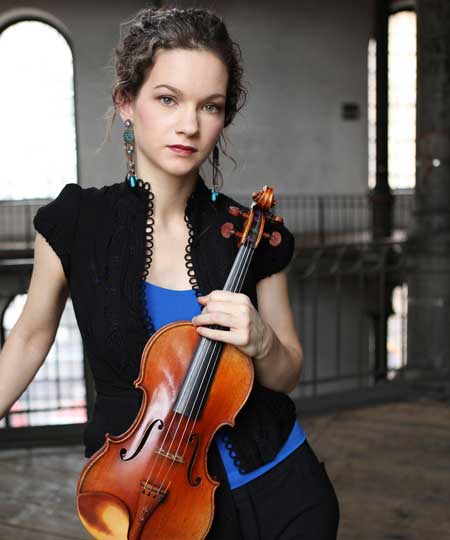Hilary Hahn: Bach in Beijing
 |
|
Grammy Award-winning violinist Hilary Hahn |
Violinist Hilary Hahn's musical career has been on fast track since her early teenage major orchestral debut.
Gramophone magazine's 2008 Artist of the Year, the two-time Grammy Award-winning soloist is, not surprisingly, constantly in demand, giving 80-100 concerts a year with the world's elite orchestras; she records continually, playing both a classical and modern repertoire and has posted and offered advice for young musicians and concert-goers on her web site for 14 years, as well as updating her own YouTube channel regularly, interviewing other musicians.
Child prodigy
Less than two weeks after her benefit concert in Baltimore to raise money for Japan's earthquake and tsunami victims with pianist Valentina Lisitsa, Hahn gave much-lauded shows at Beijing's National Centre for the Performing Arts (NCPA) on Friday and the Shenzhen Concert Hall on Sunday with the English Chamber Orchestra, playing Josef Haydn, Mozart, Antonin Dvorak and Tchaikovsky.
Besides her technical brilliance and engaging presence on stage, Hahn's tacit collaboration with the orchestra, which helped bring out the best of the pieces, also won praise from critics and music fans alike. "I just try to perform the best as I can; I try to connect with the audiences; I try to give music justice," Hahn said ahead of her show at NCPA.
Born in Lexington, Virginia in 1979, Hahn began playing the violin at three in the Suzuki program of the Peabody Conservatory. Studying with legendary violinist Jascha Brodsk at The Curtis Institute of Music, her major orchestral debut came with the Baltimore Symphony in 1991 and her international debut followed at age 14 in Hungary.
The child prodigy's first album, Hilary Hahn Plays Bach, was the second half of the Sonatas and Partitas of Bach, including violin concertos with the Los Angeles Chamber Orchestra. With 11 solo albums, her repertoire covers Bach, Stravinsky, Elgar, Beethoven, Vaughan Williams, Mozart, Schoenberg, Paganini, and Hahn has received critical acclaim for "accomplished [and] compelling" live performances by the reserved critics at the New York Times.
In quest of Bach
But it is Johan Sebastian Bach that she plays more frequently than any other. Now she practices Bach everyday and performs him every week, either at school, a Q & A session, or in concert. To her, Bach has an effect she describes as "spiritual."
"The repertoire is so rich, it's hard not to play it. It works everywhere and in all contexts," said the violinist. "The depth of Bach allows musicians to interpret it any way they want, and people can really pour themselves into it, or hold themselves back. There's a kind of a balance there that you have to strike. You can't just go all out and have it sound like Bach still."
Hahn said she felt her music is still in flux for her. "[It's] kind of a neverending quest in a way. For me there is no final interpretation. It keeps changing.
"A lot of people forget that in classical music there is a permanent creative process that deals with interpretation. And how you interpret something, it's very personal and very abstract. It's really making something from scratch."
The reason why she always chooses to play Bach as encore is because people are easily attracted by techniques but often overlook the music itself. What she wishes the audience to get from each concert is satisfaction instead of just excitement.
Contemporary classical
Primarily a classical musician, Hahn has participated in a number of other projects and collaborations and is active on the contemporary classical music scene, working with living composers to commission, perform and record albums written by them.
In 1999, she premiered and recorded a violin concerto written by the American bassist and composer Edgar Meyer, and in 2009 she did the same with Jennifer Higdon.
Working with living composers "reminds me of how flexible interpretations can be. It also reminds me of the different part of the creative process of music I don't get exposed to everyday."
Now she has asked 26 composers to write for her, with 13 pieces so far completed. "It's nice to get the pieces, as they are all different from each other because the composers' style is distinctive.
"You start out with the same goal. You know that you are going to get a piece at a certain time. When you work with them, you can program, you can think about it even when it does not exist yet. I like the commission process for that," she explained. "You can actually talk with the composer as it is being done and see what they are thinking and why they are thinking that."
Although she won't premiere them until next season, she plans to play some in recital. "I want people to know what they are listening to and I also want to show that, like in the old days, that encores don't just have to be encores…They can also be in the program and be musically balanced."
In doing so, she hopes to encourage other performers to play from the new repertoire, as well as keep classical musical relevant and fresh for younger audiences. Indeed, although the majority of classical audience are somewhat graying, Hahn said she is happy to notice more younger people coming to her concerts.
One just need to be open minded to enjoy classical, Hahn explained: "To be interested in hearing what artists bring to the stage. The most important thing when you are a listener is not to have preconceptions. Don't think if you know the piece that it is going to be played in a certain way. Be open-minded and treat every concert as a new experience."
 0
0 







Go to Forum >>0 Comments